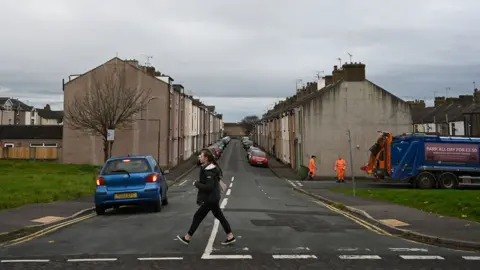Levelling up needs to be more than a slogan, say Tory MPs
 AFP
AFPOne thing Tory MPs agree on when it comes to "levelling-up" is that not many people know what it really means.
It is one of Boris Johnson's favoured catch phrases, one he frequently uses to describe a broad ambition to spread wealth and opportunity more fairly.
But for something so central to the government's plan for the country, some of its own MPs aren't clear about the plan to deliver.
While Tory MPs support the idea, one said: "So far it's a lot of buzzwords that aren't meaningful.
"It needs to be more than just a slogan."
Another demanded "meat on the bones".
At the forthcoming Conservative Party conference, there will be pressure on the prime minister to spell out how he plans to realise this key election promise now the pandemic is less demanding of government time.
Ministers point to schemes that are already underway as evidence that "levelling-up" has started: moving civil service jobs out of London, funding to improve high streets and town centres and multi-million-pound infrastructure schemes.
This attention and investment have undoubtedly been welcomed - some even think it's started to have an impact in their constituencies - but for others it'll take much more.
Jo Gideon, the MP for Stoke-on-Trent Central, says: "The challenge has been the need to be seen doing something quickly.
"In the early stages there was a need for shovel ready projects - you cannot change decades of decline with shovel ready projects alone.
"I'm not dismissing that - it is important to been seen to be doing things, it is important for the psyche of people who have felt left behind for a long time that they can see and feel something happening.
"But the spirit of levelling up is more about opportunity, and you can't build this opportunity overnight.
"It is less about shiny new buildings than concentrating on the real grassroots - whether people can make ends meet, pay their bills.
"Levelling up needs to start at a much more basic level in places like Stoke-on-Trent."
Conservative MPs talk of the need to combine physical improvements like better housing, high streets, transport and broadband with skills, training and crucially jobs.
And there is real worry about the impact of spiralling energy costs, rising prices and planned tax increases on the most vulnerable communities.
While no-one thinks there are easy solutions, most recognise there is a political risk to failure, particularly for a party that made big promises to newly won seats in the Midlands and the North.
One senior Conservative MP said: "I think even if they get through the next election, I think they'll run out of road very quickly if they're not shown to deliver."
Michael Gove was recently brought into turbo-charge the agenda, running the newly named department for Department for Levelling Up, Housing and Communities.
His appointment is widely regarded as a good thing within the Tory party, bringing some political clout and policy firepower to the brief.
He's due to produce a white paper later this year which promises "bold new policies", and before then his conference speeches will no doubt be watched closely for signs of his thinking.
For some, meaningful change must involve shifting power and money out of Westminster to allow local communities to make decisions about their areas, with multi-year budgets and the political clout to attract private investment.
Jake Berry, chairman of the influential Northern Research Group of Tory MPs, says the civil service is "institutionally biased" towards investment in the south.
He said Whitehall needed a "complete overhaul" if the government was to deliver on the agenda, warning it would fail if it was just "government as usual".
He says: "I'd like to hear the prime minister reaffirming his commitment to full devolution across the north, because it's only when you empower people in the north to spend their own money, make their own decisions and set their own political trajectory and destiny will the levelling-up agenda deliver."
Overlooked areas?
The prime minister has promised more powers for local leaders in English counties, but there is already grappling over how this might work in practice.
Discussions over local government structures may not sound exciting but they could be crucial, if politically challenging.
For some the concern is that political focus on the Midlands and the North could mean other areas are overlooked.
Selaine Saxby, the MP for North Devon, says her constituency is not all afternoon tea and trips to the beach.
"I've had conversations with the Number 10 team and there is an understanding that it's more than the red wall or the northern powerhouse," she says.
"I just hope they reflect what we as MPs have fed in, that it is about the whole country, coastal communities, areas where there are pockets of deprivation.
"I hope we can talk about all those things."
The prime minister has promised to rebalance the economic and social opportunities of the entire country; no easy feat.
It is a bold ambition widely backed by his party, but one of his first challenges might be persuading some of his own MPs he has the clarity and commitment to deliver.
